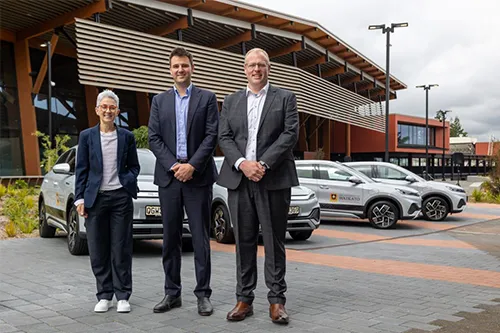Jim Mercer, Chief Operating Officer at the University of Waikato, said sustainability had been a focus for the University over the last 18 months and that moving to EVs was a natural next step.

“We’ve been working on a range of sustainability initiatives, including the launch of the world’s first Bachelor of Climate Change, replacing two natural gas boilers with low-emission alternatives, a sizeable on-campus project to replace existing lighting with sustainable LEDs, installing solar arrays on a number of buildings, and various research initiatives designed to support a sustainable future for New Zealand and the world.”
Paul Bull, EECA Public Sector Portfolio Manager, said the University of Waikato is setting a great example for other tertiary institutions and government organisations.
“The team is demonstrating how you can incorporate EVs into a fleet while also finding other, innovative ways to get the most out of their vehicles,” said Mr Bull.
The fleet upgrade has been supported with just over $2 million in operational co-funding from EECA (the Energy Efficiency and Conservation Authority), which the University has matched.
Once implemented, the University will have nearly 80 EVs available to employees. EV charging stations are also being installed at the Hamilton and Tauranga campuses.
Eventually, the University also hopes to make EVs and charging stations available to staff outside of hours. If this goes ahead, it will help the University reduce indirect scope three emissions, which are typically challenging to target2.
“This is just phase one. We will continue to make upgrades over the coming years to ensure the University of Waikato continues to take steps towards becoming more sustainable,” said Mr Mercer.
The BYD ATTO 3 has been selected as the make and model for the fleet. The implementation is being managed by Zilch car sharing, whose innovative approach will make it easier for staff to access vehicles with features like keyless access.
“This is a great example of using technology to support a sustainable future while also making things easier for employees, saving them from having to collect and return keys physically,” said Mr Mercer.
Other key partners involved in the project include Carbn Asset Management, who completed a fleet utilisation and optimisation study, and charging station installers, We.EV (owned by WEL Networks) which completed campus electrical studies to understand the capacity of the network on site.
The University is proud to be recognised for its sustainability efforts. The University of Waikato is ranked in the top 100 (of more than 1,400 institutions) in the 2024 QS World University Rankings: Sustainability. The University was also a recent finalist in the Sustainable Business Awards.
1Scope one emissions are direct greenhouse (GHG) emissions from sources controlled or owned by an organisation. For example, emissions associated with fuel combustion in vehicles.
2Scope three emissions are emissions not produced by an organisation or the result of activities from assets owned or controlled by them. It is those it’s indirectly responsible for up and down its value chain. For example, emissions created by staff travelling in private vehicles to or from campuses.
The operational funding from EECA (the Energy Efficiency and Conservation Authority) enables fleet optimisation and the leasing of electric vehicles across the Government, supporting the Carbon Neutral Government Programme in making a number of public sector organisations carbon neutral from 2025.



